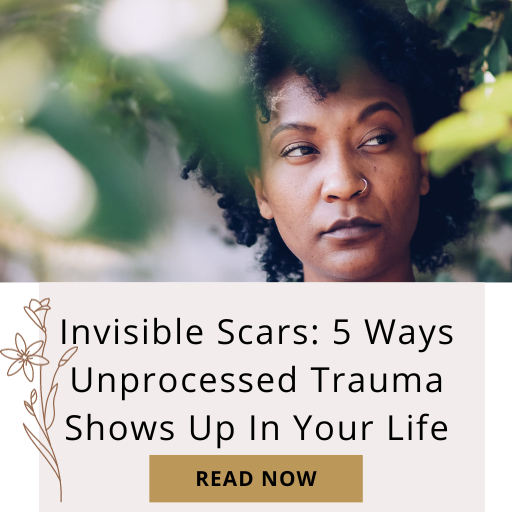Along this journey of life, none of us will get by unscathed by some degree of trauma. While in many cases, life may go on and the long-term effects of those traumas may not stay with us. There are some that do. Especially if we’re unable to get the help needed to process through and unpack that trauma. Some of the ways in which trauma may continue to affect us throughout our lives may fly largely under the radar. We often attribute such things to our personality, or simply “being that way”. In many cases, that’s not accurate. In a way, unhealed trauma is like an alarm that blares louder and louder when left unchecked. These are some of the ways unprocessed trauma can show up in our lives years, or even decades after:
- Memory Challenges: Unprocessed trauma can cause blanks in memory, or what some may describe as “blacked out” or “redacted” memories. It can be deeply distressing to be unable to recall certain situations, but it is one of the more common after-effects of unprocessed trauma. It is also one of the more overlooked symptoms, as it’s often mistaken for cognitive challenges or cognitive decline due to age or disease.
- Hyper-vigilance: Often seen with survivors of violence or traumatic events, and one of the hallmarks of military men and women who come home with PTSD, hyper-vigilance is an overexaggerated startle response. This can be an ever-present challenge where one is constantly in a state of alertness, expecting danger, or it can be situational. Hyper-vigilance is exhausting for the nervous system because it keeps the nervous system in a highly aroused state constantly scanning for danger. The body isn’t designed to operate in this mode for extended periods of time and wreaks havoc on the nervous system.
- Physical Pain: Unprocessed trauma can and often does manifest in physical pain. This includes diseases such as Fibromyalgia, migraines, digestive issues, etc. Unprocessed trauma can psychosomatic pain, which is pain that the body feels that stems from a psychological cause. Although the cause of the pain is psychological, it doesn’t make the pain any less real than if it were caused by a physical ailment.
- Explosive Emotional Responses: A common behavior we see in people who are traumatized is the explosive emotional responses that can be triggered by seemingly minor instances. These intense emotional responses can sometimes end in violent situations, jeopardizing one’s health and well-being as well as their freedom. This behavior can often end up in someone getting hurt or landing in prison.
- Tumultuous Relationships: Unprocessed trauma can interfere with our ability to form healthy relationships. Sometimes that can manifest in a cycle of relationships with toxic partners, accepting abusive behavior, and struggles to establish love and safety within relationships. Many times there is a pattern in the types of partners one chooses until they can heal and grow, and see that they deserve better.
While suffering from unprocessed trauma may feel like a lonely and isolated space, there are millions of people who share the experience of how trauma continues to impact their lives. We are not prisoners to our traumas. If you recognize unprocessed trauma rearing its head in your life, reach out to a mental health professional and get the help you need to move forward with your life. Your future is bright, don’t let the effects of unprocessed trauma hold you back from enjoying your life to the fullest.

